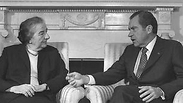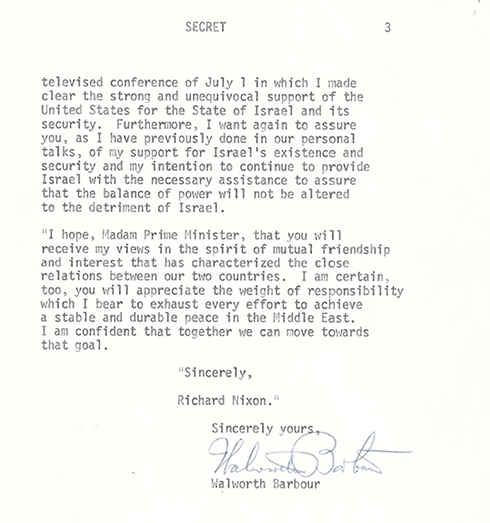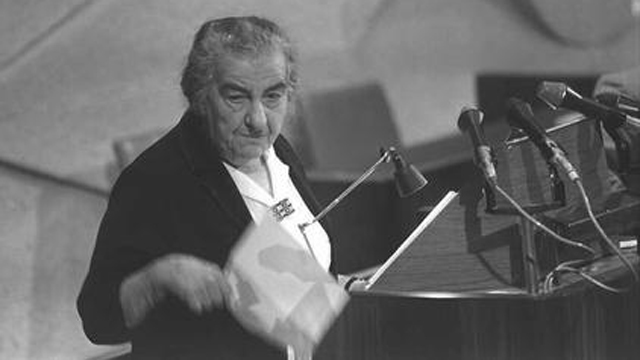
Israel declassifies cabinet minutes on first US-sponsored peace plan
The Rogers Plan, named for then US secretary of state, sought to engage Israel and the Arab state in a peace process. 45 years on, splits in Golda Meir's cabinet over the plan, that was never implemented, are unveiled.
Israel State Archives on Sunday declassified official documents that reveal the Israeli government's mixed reaction to a 1969 American-sponsored Israeli-Arab peace plan.
The plan, known as the Rogers plan after then US Secretary of State William Rogers who initiated it, called on Israel to withdraw from the territories it had recently occupied in Sinai, the West Bank and the Golan Heights.
The Israeli government, led by Golda Meir, debated the proposal and eventually decided to accept it, albeit not verbatim. The decision led to the dissolution of the unity government, when the ministers of Gahal (Likud's predecessor), led by Menachem Begin, resigned from the government in protest, a mere eight years before Begin would sign a peace accord with Egypt.
Rogers failed to mediate a peace accord between Israel and the Arab world, but succeeded in mediating a cease-fire that, on August 8, 1970, brought to an end the War of Attrition, that had claimed the lives of hundreds of Israeli soldiers along the Suez Canal.
During intense deliberations between June and August 1970, the American proposal was initially rejected, but following intense pressure exerted by then US President Richard Nixon.
"I ask you and your Government to review this matter in hopes that a prompt affirmative reply from the Government of Israel will lead to an early stop of hostilities and bloodshed on both sides," Nixon wrote to Meir on July 24, in a freshly unveiled dispatch.
An intransigent stance on both sides led to the failure of the Rogers Plan. Meir, for her part, insisted on launching direct negotiations between Israel and the Arab countries without preconditions. She rejected Rogers' suggestion, as well as that of UN mediator Gunnar Jarring, that Israel make goodwill gestures, such as a phased withdrawal from the banks of the Suez Canal, that would enable Egypt to open it for international traffic. Also, Meir rejected any prospect of a full withdrawal from the Sinai Peninsula further down the line.
Anwar Sadat's Egypt was also instrumental in hindering the plan, since it adamantly refused to consider negotiating with Israel.
The failure of the Rogers and Jarring peace initiatives were among the factors that led Egypt and Syria to launch the 1973 Yom Kippur War.
"I want to assure you that we will not press Israel to accept the (positions of the Arab countries)," Nixon wrote to Meir. "Our position on withdrawal is that the final borders must be agreed between the parties by means of negotiations… Moreover, we will not press Israel to accept a refugee solution which would alter fundamentally the Jewish character of the State of Israel or jeopardize your security."
A week later, on July 30, Minister Begin voiced his fierce opposition to the plan: "Dear Mrs. Meir, you cannot expect us to endorse this document, which includes an Israeli commitment to hand over most of Judea and Samaria to (King) Hussein (of Jordan). Can anyone expect me to agree to that? For 18 years I said time and again that we have the right over Judea and Samaria and the Land of Israel and now, when we actually control these territories, I will concede to giving them away?"
During the same meeting Israel Defense Forces Chief of Staff Haim Barlev briefed the cabinet on the progress of the war. On that day, Israel Air Force pilots engaged in an aerial battle with Soviet warplanes.
"Two of our planes launched a successful attack on Egyptian radar 30 kilometers south of Suez," he told the ministers. "Four MIG 21 aircraft, flown by Soviet pilots, were dispatched in response, following by another eight aircraft. Four were shot down by anti-aircraft missiles – the Russian pilots' combat inexperience was evident."
"The battle lasted six minutes, and our own record was broken," Bar Lev continued, "when one of our pilots scored a 12th successful interception. There were no losses on our side."
On August 4, 1970, Gahal minister announce their intention to resign. In his statement, Begin mentioned Meir's predecessor, Levi Eshkol, who had invited Gahal into his cabinet three years prior: "Eshkol proved that his public image was far removed from his actual statesmanship. It is patently untrue that he was incapable of making tough decisions. He accepted, initiated and supported moves of historic importance. (During the Six Day War), we decided together to liberate Jerusalem. Without him, that decision would not have been made. The reunification of Jerusalem would have been impossible without the late Prime Minister's leadership."
Meir bid farewell to Begin and his ministers: "I have to admit that when I assumed my position I was very skeptical of it, but I'd like us all to witness the arrival of peace, and if we don't, I hoped I would be as successful as Eshkol was in maintaining this partnership. I regret not having seen peace. I regret seeing part of my cabinet leave."













